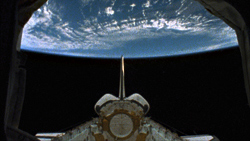Werner Herzog for president, anyone? That would certainly make the 2008 elections more interesting. If Al Gore can run again, why let Herzog’s German citizenship get in the way? Or, as a proxy candidate, I wouldn’t mind seeing Brad Dourif ranting on the podium. (Old Grima Wormtongue could teach Karl Rove a few new tricks.) In Herzog’s sci-fi fable The Wild Blue Yonder, Dourif plays an alien who came to Earth a few hundred years ago—receding hairline and gray ponytail indicating his age—and now wants to warn us that we, having ruined our own planet, are now futilely looking for a new home to colonize. All the way back in the Andromeda galaxy, millions of light-years away, where Dourif came from. The irony, or so Herzog would have it, is cosmic: Dourif knew that his old home was uninhabitable, but no one asked him, so we made the long journey in reverse, as he explains rather omnisciently. Man or alien—no one ever learns from their mistakes.
Yonder is the newest of four Herzog titles being screened over the next two weeks at the Northwest Film Forum. It’s also the least successful of the batch. Aside from Dourif wandering peevishly around what looks to be an old dump in Indio, Calif., the bulk of the movie is stock footage that Herzog first compiled, then wrote a script to suit. It’s the same method behind Lessons of Darkness (1992), filmed after the oil wells of Kuwait were set aflame by the retreating Iraqi army during the first Gulf War. Somewhat better known is Herzog’s final 1987 feature with Klaus Kinski, Cobra Verde, about a Brazilian bandit who builds a slave-trading empire in West Africa. (Next week is Wheel of Time, a documentary about Buddhist monks.)
What do these films have in common? Purity, corruption, delusion, madness, colonization, chaos, nature, wormholes in the fabric of space . . . how big is your German-to-English dictionary? I would point to a unifying sense of planetary disgust: Look what we’ve made of creation, says Herzog, look at the mess we’ve caused. As Dourif and his alien buddies discovered on arrival here, “It wasn’t all great on this planet.” Specifically, he points to the “sin” of our human settlements, towns, cities, and civilizations.
Images of our supposed voyage to the Andromeda galaxy are actually NASA footage from a 1991 space shuttle mission, and they drag on long enough—shots of zero-G calisthenics, etc.—that you really feel the 820-year duration of their flight. Herzog also tosses in a few interviews with real scientists. One declares, “Chaos is not such a bad thing,” a view that Yonder supports when our astronauts finally return home.
KINSKI PLAYS another sort of sojourner in Cobra Verde (based on a Bruce Chatwin novel), one who eagerly helps ransack nature—first as a gold miner, then as a slave merchant and white African despot complete with Napoleon hat. Though seemingly a man without conscience, he finally admits of slavery, “It was a crime.” He’s undeluded, a scrupulous villain to the end. Cobra Verde isn’t one of the better Herzog-Kinski collaborations, but the last shot stays with you like a bad dream: His fortune lost, slavery outlawed, Kinski staggers along the beach bereft of purpose while pursued by a grotesquely deformed African who walks on his hands, towing his useless legs behind him like a child’s withered limbs. He’s slavery embodied, or Kinski’s twisted soul—the legacy, somehow, of our greed and violence and intrusion someplace we don’t belong.
Lessons of Darkness is the most pertinent and powerful of this Herzog quartet, because on its surface the film is both about war and our degraded environment. Set to a classical jukebox of Grieg, Mahler, Schubert, Wagner, and others, Darkness is basically an hour-long aerial montage. Have you seen those cheesy old KCTS pictorials like Over Washington? This one is like Over Hell—angry flaming oil wells, giant geysers of orange hate, American contractors creeping toward them like supplicant insects bearing fire hoses and TNT, the flat sand blackened for miles around, lakes and rivers turned into oil sloughs. Nature is profaned, and the Earth is in revolt—almost vomiting up its bile in response to our activity on the surface.
Yet this, too, is a sci-fi parable of sorts, even if we’re tempted to see it as documentary. Herzog invents a kind of Promethean story in which mankind actually lusts for the terrible inferno, lights these foul desert candles, in order to extinguish them again. (It’s a ritual, perhaps, like dragging a ship over a mountain range.) In the same manner, he invents the opening epigraph by Pascal: “The collapse of the stellar universe will occur like creation—in grandiose splendor.” Which wouldn’t sound the same coming from Dourif, but you get the idea.
If Darkness concludes in a never- ending cycle of apocalypse, however, Yonder isn’t finally quite so pessimistic as some might expect of Herzog. Nobody would’ve gone to see An Inconvenient Truth if Gore weren’t peddling just a little hope for eco-redemption. Herzog also seems to be dangling that possibility, even if it depends on us not being around to witness our planet’s green resurrection.








